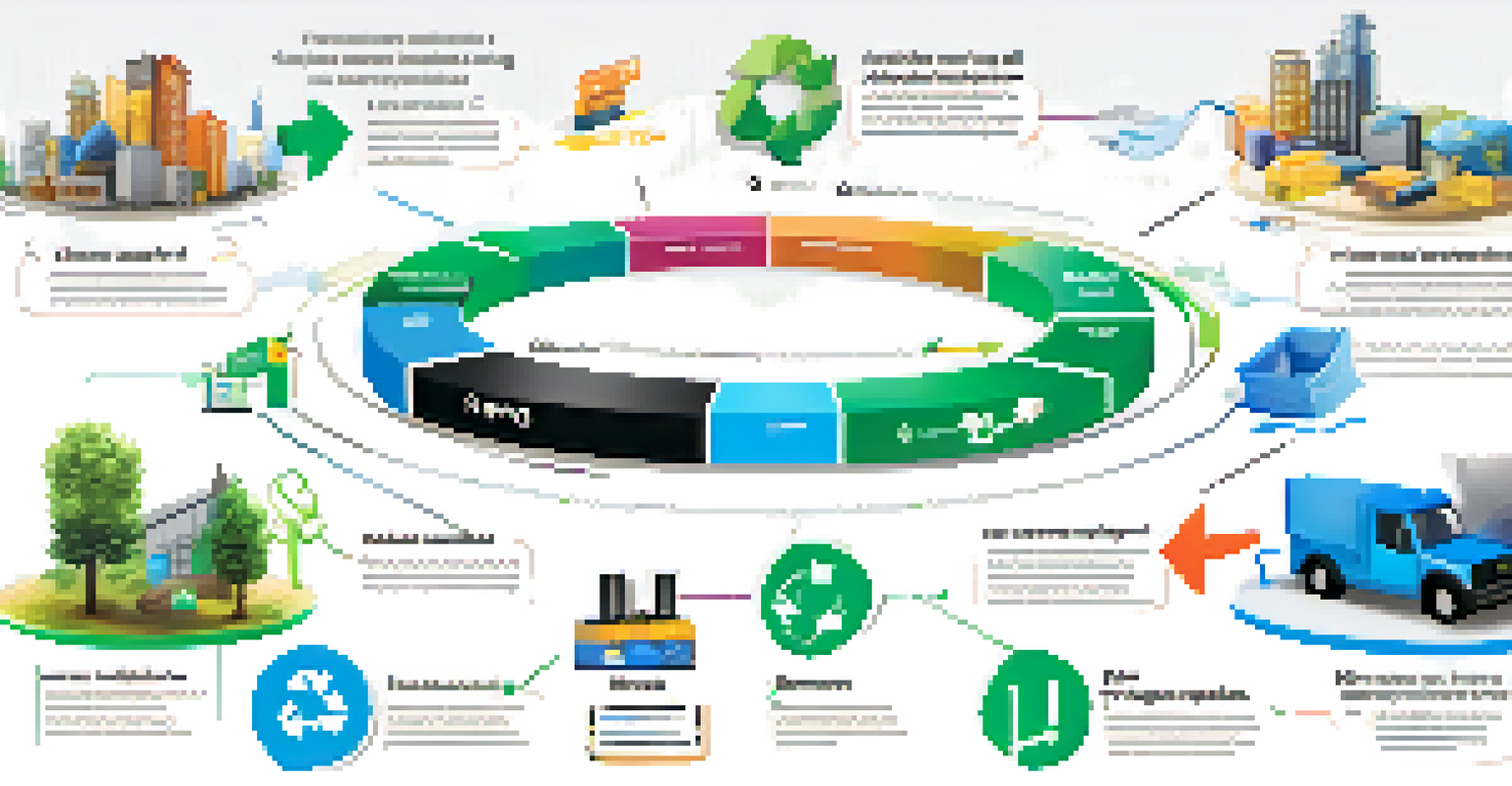Blockchain's Impact on Sustainability in Supply Chains

Understanding Blockchain Technology in Supply Chains
Blockchain technology is often associated with cryptocurrencies, but its applications extend far beyond that. In supply chains, blockchain serves as a decentralized ledger that records transactions securely and transparently. This means every participant in the supply chain can view and verify the movement of goods, making it easier to track their origins and journey.
Blockchain is the perfect technology to track the journey of goods, ensuring transparency and accountability in supply chains.
Imagine a world where you can trace a product's journey from the farm to your table. With blockchain, this is possible. Each time a product changes hands, a record is created, providing a clear history. This level of transparency not only builds trust among consumers but also helps businesses identify inefficiencies in their processes.
Moreover, the traceability provided by blockchain can help ensure compliance with environmental regulations. When companies can prove the sustainability of their products, it not only enhances their brand reputation but also contributes to a more responsible supply chain.
Enhancing Transparency for Better Decision-Making
One of the standout features of blockchain is its ability to enhance transparency. In a traditional supply chain, information is often siloed, making it difficult for companies to access the data they need. Blockchain changes this by providing a single source of truth that all participants can access, enabling better-informed decisions.

For instance, if a company discovers that a supplier is not adhering to sustainable practices, they can quickly switch suppliers without significant delays. This agility can lead to more sustainable sourcing decisions, as companies can prioritize partners who align with their environmental goals.
Blockchain Enhances Supply Chain Trust
By providing a transparent and tamper-proof system, blockchain fosters trust among all participants in the supply chain.
Additionally, consumers are increasingly demanding transparency about the products they purchase. With blockchain, companies can share information about their sourcing practices, empowering consumers to make sustainable choices that align with their values.
Reducing Waste Through Improved Efficiency
Waste is a significant concern in supply chains, where overproduction and inefficiencies can lead to unnecessary environmental harm. Blockchain can play a crucial role in reducing waste by streamlining processes and improving inventory management. When all participants have real-time access to data, they can better predict demand and adjust production accordingly.
In a world where consumers are increasingly aware of the impact of their choices, transparency in the supply chain is no longer a luxury, but a necessity.
For example, a retailer using blockchain technology can monitor inventory levels across its supply chain. If they notice that certain products are overstocked, they can take action to reduce future orders or promote sales to clear excess inventory. This not only minimizes waste but also maximizes resources.
By optimizing supply chain operations, businesses can significantly lower their carbon footprint. Fewer resources used in production and distribution means less environmental impact, making blockchain a powerful ally in the fight against waste.
Empowering Ethical Sourcing and Fair Trade Practices
Ethical sourcing has become a priority for many consumers, and blockchain can help ensure that companies adhere to fair trade practices. By documenting every step of the supply chain, businesses can demonstrate their commitment to ethical sourcing. This transparency reassures consumers that the products they purchase are not only sustainable but also ethically produced.
Consider the coffee industry, where consumers often want to know that their coffee beans are sourced from fair trade producers. Blockchain allows companies to verify the origins of their coffee and share this information with consumers. This level of accountability fosters trust and encourages consumers to support ethical brands.
Improving Efficiency Reduces Waste
Real-time data access through blockchain helps streamline processes and better manage inventory, significantly minimizing waste.
Moreover, as companies adopt blockchain technology, they can collaborate with suppliers to uphold ethical standards. This partnership approach not only benefits the supply chain but also helps uplift communities involved in production.
Facilitating Circular Economy Initiatives
The concept of a circular economy revolves around reducing waste and making the most of resources by reusing and recycling materials. Blockchain can facilitate this by tracking products throughout their lifecycle, ensuring that materials are repurposed effectively. By monitoring how products are used and disposed of, companies can create systems for reclaiming materials.
For example, a manufacturer can use blockchain to track the lifecycle of their products. When a product reaches the end of its life, the company can easily identify how to recycle or repurpose its components. This not only minimizes waste but also reduces the need for new raw materials.
Implementing circular economy practices through blockchain can lead to substantial environmental benefits. It encourages companies to innovate and find new ways to use resources, ultimately contributing to a more sustainable future.
Building Trust Among Stakeholders
Trust is a critical component of any supply chain, and blockchain helps foster this trust by providing a transparent and tamper-proof system. When stakeholders can verify the authenticity of information, they are more likely to collaborate effectively. This trust extends not only to suppliers and manufacturers but also to consumers who want assurance about the sustainability of their purchases.
For instance, if a company claims that its products are made from recycled materials, blockchain allows stakeholders to verify this claim. This verification process can significantly enhance brand credibility, which is essential in today’s environmentally conscious market.
Supports Ethical Sourcing Practices
Blockchain allows companies to document and verify ethical sourcing, reassuring consumers about the sustainability and fairness of their purchases.
By building trust through transparency, companies can enhance relationships within their supply chains, driving collaborative efforts toward sustainability. Trust leads to better partnerships, which can amplify the positive impact on environmental practices.
Challenges and Future Prospects of Blockchain in Supply Chains
While blockchain presents numerous benefits for sustainability in supply chains, it’s not without challenges. Implementation can be complex and requires significant investment in technology and training. Additionally, there may be resistance from stakeholders who are accustomed to traditional systems.
However, as awareness of blockchain's potential for sustainability grows, more companies are beginning to embrace it. The key will be to educate stakeholders about the long-term benefits, including increased efficiency and reduced environmental impact. As more businesses adopt blockchain, we can expect to see a shift in industry standards toward more sustainable practices.

Looking ahead, the integration of blockchain with other technologies such as IoT (Internet of Things) and AI (Artificial Intelligence) could further enhance its effectiveness in supply chains. Together, these technologies could lead to smarter, more sustainable supply chain solutions that benefit businesses and the planet.